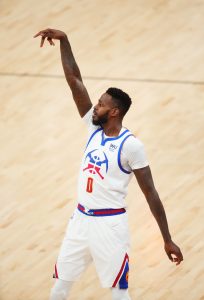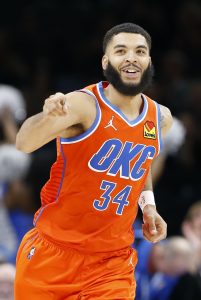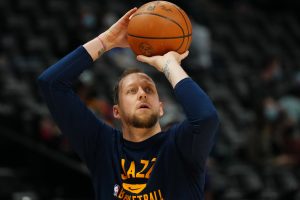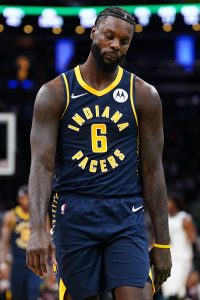With the NBA’s February 10 trade deadline around the corner, we’re taking a closer look at all 30 teams, breaking down their potential plans for the deadline and identifying their most likely trade candidates. We’re focusing today on the Northwest Division.
Denver Nuggets
Trade deadline goals:
A report in early January clearly laid out the Nuggets’ goals: Denver was in the market for help on the wing, along with a backup center. Since then, the team has made a trade with the Spurs to acquire sharpshooter Bryn Forbes and signed big man DeMarcus Cousins to a pair of 10-day contracts.
While the Nuggets moved quickly to address their most pressing needs, we shouldn’t necessarily assume they’re done dealing. Forbes and Cousins are good offensive players, but they could be exposed on defense in big games. That’s the main reason why Forbes fell out of the Bucks’ rotation in the NBA Finals last year, and why Cousins has had a hard time finding a permanent home since dealing with a series of leg injuries from 2018-20.
The Nuggets will likely continue shopping for players – especially on the wing and in the frontcourt – who are more reliable two-way contributors. However, the team’s assets are limited, so it may end up being a fairly quiet deadline.
That wouldn’t be the end of the world for Denver though. The team is holding out hope that Jamal Murray and Michael Porter Jr. will be able to return to action by the time the playoffs begin in April. If the Nuggets can get both players back healthy, they’ll be more significant lineup additions than just about any team can hope to acquire at the trade deadline.
Top trade candidates:
 JaMychal Green and Jeff Green have popped up in trade rumors here and there this season, but if the Nuggets are going to move either Green, it would probably have to be for a clear upgrade. Jeff has been in the starting lineup for the last month, so I’m skeptical he’ll be shopped; JaMychal is struggling this season, but would have the ability to veto any trade he doesn’t like.
JaMychal Green and Jeff Green have popped up in trade rumors here and there this season, but if the Nuggets are going to move either Green, it would probably have to be for a clear upgrade. Jeff has been in the starting lineup for the last month, so I’m skeptical he’ll be shopped; JaMychal is struggling this season, but would have the ability to veto any trade he doesn’t like.
If they do try to move one of those forwards or another veteran player for a roster upgrade, the Nuggets will be hard-pressed to find sweeteners. Having traded away R.J. Hampton and Bol Bol in the last year, they don’t really have expendable prospects to include in trade offers anymore — Bones Hyland and Zeke Nnaji are still around, but they’ve looked good this season and are part of the regular rotation.
Denver’s previous trades also left the club without the ability to realistically trade a future first-round pick due to the Stepien Rule and the Seven-Year Rule. Second-round picks in 2024, 2025, and 2026 are essentially the Nuggets’ only draft ammo.
Minnesota Timberwolves
Trade deadline goals:
The Timberwolves’ desire to land a power forward has been an open secret for the last couple years, and it remains a top priority for the club. However, the urgency to address the position has been lessened by the emergence of Jarred Vanderbilt and the continued development of Jaden McDaniels.
A lineup that includes Karl-Anthony Towns, Anthony Edwards, and D’Angelo Russell doesn’t require any more offense-first players who need the ball in their hands, so defense-first players like Vanderbilt and McDaniels (along with guard Patrick Beverley) have meshed well with Minnesota’s stars.
Still, a player who can provide solid defense like Vanderbilt and McDaniels while more reliably knocking down open three-point looks would be an even better fit in the frontcourt. It would keep opposing defenses more honest and would give the Wolves’ top scorers more room to operate. Minnesota will remain on the lookout for that kind of player, with Harrison Barnes and Robert Covington among the veterans who would make sense as targets.
The Wolves have also remained involved in the Ben Simmons sweepstakes, but probably won’t have the assets to make a serious play for him unless Philadelphia significantly lowers its asking price.
Top trade candidates:
Malik Beasley is one player the Timberwolves are known to be shopping. In theory, he could be the sort of three-and-D wing who would make sense alongside Edwards, Russell, and Towns, but both his shooting and defense have been erratic this season — Minnesota has been about eight points per 100 possessions better when he’s not on the court.
Beasley’s contract isn’t exactly team-friendly, but it’s not a major albatross either. He makes $14.5MM this season and $15.6MM in 2022/23, with a $16.5MM team option for 2023/24. In other words, if he doesn’t bounce back going forward, he’s just a few months away from being on an expiring deal.
Beasley isn’t a significant asset on his own, so the Wolves would need to attach a young player or draft pick if they’re seeking an upgrade. McDaniels, Naz Reid, or Jaylen Nowell could fit that bill.
If a team is unwilling to take on Beasley’s multiyear contract, Taurean Prince‘s expiring deal could be in play. Former first-round pick Josh Okogie is also a trade candidate, and the Wolves have even been willing to discuss Beverley, though the odds of him being moved are slim.
Oklahoma City Thunder
Trade deadline goals:
Stop us if you’ve heard this before, but it looks like the Thunder’s primary goal at this season’s deadline will be to acquire more draft picks.
Someday, the Thunder will shift from asset accumulation mode into contending mode, but that day hasn’t arrived yet. At 16-34 and with Shai Gilgeous-Alexander battling an ankle injury, Oklahoma City isn’t in the running for a play-in spot in the West and is once again prioritizing player development and draft positioning over its place in the standings.
The Thunder are well positioned to acquire draft picks this season even if they don’t want to sell off any of their current players. Their cap situation means they’ll get the first call from any team looking to dump an unwanted contract. And, depending on the size of the contract, they should be able to accommodate multiple deals — if they remove all the cap holds from their books, the Thunder will have over $33MM in cap room to work with.
Oklahoma City acquired two future first-round picks in the 2021 offseason by taking on Kemba Walker and Derrick Favors in separate deals. They’ll be looking for ways to do that again at the deadline.
Top trade candidates:
 While the Thunder could be satisfied to take on unwanted contracts and the draft picks that come along with them, they also could shop two or three of their veterans, if they so choose.
While the Thunder could be satisfied to take on unwanted contracts and the draft picks that come along with them, they also could shop two or three of their veterans, if they so choose.
Kenrich Williams is perhaps the most intriguing player in this group. A throw-in for salary-matching purposes in 2020’s Steven Adams trade, Williams has emerged as a reliable (and underrated) three-and-D forward who would fit nicely into most playoff teams’ rotations. I’m not sure the Thunder will get the first-round pick they reportedly want for him, but it’s certainly not inconceivable, especially if they take back some bad money. Williams is under contract through next season at just $2MM per year.
Oklahoma City would also presumably move Favors for a modest return, but he has a $10MM+ player option for 2022/23, so he’s probably doesn’t have positive trade value at this point.
Certain Thunder youngsters – particularly Gilgeous-Alexander and Josh Giddey – will be off the table at the deadline, but the club will be willing to discuss the ones who are less likely to be part of the long-term plan in OKC. I expect the Thunder to receive plenty of inquiries on Luguentz Dort — I’d be surprised if they move him unless they get an offer they can’t refuse.
Portland Trail Blazers
Trade deadline goals:
There are a whole lot of directions the Trail Blazers could go at the trade deadline.
The most logical direction based on their roster situation and their place in the standings – and the one we’re assuming they’ll take – would be to hang onto injured star Damian Lillard and their most promising young players (Anfernee Simons and Nassir Little), making any other veterans available as they prioritize next season over this one.
At 21-31, the Blazers are hanging onto the 10th spot in the Western Conference and could conceivably make the playoffs. But even with Lillard back, this isn’t a team that’s going to contend for a title — or even win a first-round series. So reshaping the roster a little and trying to bounce back in 2022/23 makes the most sense.
Top trade candidates:
Focusing on next season means veterans on expiring contracts are logical trade candidates. In Robert Covington and Jusuf Nurkic, Portland has two good ones. Covington, in particular, should net a nice return, with so many playoff teams in the market for a two-way wing.
If the Blazers are willing to move Larry Nance Jr. just a few months after surrendering a first-round pick to acquire him, he’d likely draw plenty of interest too. But he’s under contract for 2022/23 at a team-friendly rate, so there’s no urgency at all to make a move with him.
Simons’ recent emergence has made him a worthwhile long-term keeper, but a backcourt made up of Lillard, Simons, CJ McCollum, and Norman Powell is just too crowded. Even though trading a contract as big as McCollum’s or Powell is harder to do during the season than in the summer, I expect the Blazers will be very open to discussing both players. Ben McLemore is another guard who could be on the move in the next week.
Portland’s front office situation is worth taking into account as we consider what they may or may not do at the deadline. Will interim GM Joe Cronin have the freedom to make significant changes to the roster? Based on the changes he has already made to the organization’s basketball operations department, it appears the answer is yes.
Utah Jazz
Trade deadline goals:
The Jazz couldn’t ask for a better defensive anchor than Rudy Gobert, but the three-time Defensive Player of the Year isn’t getting a whole lot of help on that end of the floor. Despite Gobert’s presence, Utah ranks in the middle of the pack in defensive efficiency. The team is also giving up nearly nine more points per 100 possessions when Gobert isn’t on the court.
The Jazz’s top priority at the trade deadline stems from this shortcoming — the team badly needs another solid defensive wing or forward who won’t be a black hole on the offensive end. Adding a second unit play-maker who could step in for injured forward Joe Ingles would be a bonus.
Like Minnesota, the Jazz would love to acquire a forward like Jerami Grant, Harrison Barnes, or Robert Covington, but they aren’t loaded with the assets necessary to make it happen. Utah can’t trade a first-round pick earlier than 2026, and even then, it would have to be conditional (based on the team’s traded 2024 first-rounder not falling in its protected range). The club also lacks the sort of promising young prospects who would move the needle in a trade offer.
If those higher-end targets are out of reach, the Jazz could shift their focus to a Plan B like Josh Richardson or a Plan C such as Josh Okogie or Jarrett Culver.
Top trade candidates:
 Ingles has been lauded for years for his impact both on the court and in the locker room. However, he became a trade candidate this year due to his expiring contract and his declining production. Unfortunately, a season-ending ACL tear makes him even more expendable — he won’t be able to play again before his contract expires, so his $13MM salary represents a logical matching piece for the Jazz.
Ingles has been lauded for years for his impact both on the court and in the locker room. However, he became a trade candidate this year due to his expiring contract and his declining production. Unfortunately, a season-ending ACL tear makes him even more expendable — he won’t be able to play again before his contract expires, so his $13MM salary represents a logical matching piece for the Jazz.
Reigning Sixth Man of the Year Jordan Clarkson has seen his shooting efficiency fall off this season — his .400 FG% would easily be a career low. I imagine Utah would be open to moving him in a deal for a defensive upgrade, but his guaranteed $13.3MM salary next season and a $14.3MM player option for 2023/24 may turn off some potential trade partners.
Like Clarkson, Bojan Bogdanovic is an important part of Utah’s scoring attack, but could probably be had in a trade that upgrades the team’s defense without dealing a significant blow to the offense.

 While the Thunder could be satisfied to take on unwanted contracts and the draft picks that come along with them, they also could shop two or three of their veterans, if they so choose.
While the Thunder could be satisfied to take on unwanted contracts and the draft picks that come along with them, they also could shop two or three of their veterans, if they so choose. Ingles has been lauded for years for his impact both on the court and in the locker room. However, he became a trade candidate this year due to his expiring contract and his declining production. Unfortunately, a season-ending ACL tear makes him even more expendable — he won’t be able to play again before his contract expires, so his $13MM salary represents a logical matching piece for the Jazz.
Ingles has been lauded for years for his impact both on the court and in the locker room. However, he became a trade candidate this year due to his expiring contract and his declining production. Unfortunately, a season-ending ACL tear makes him even more expendable — he won’t be able to play again before his contract expires, so his $13MM salary represents a logical matching piece for the Jazz.